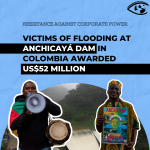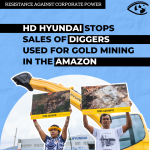Nigeria Defeats US$11 Billion Award For Canceled Natural Gas Processing Plant

Photo: William Muzi. Used under Creative Commons license.
Nigeria has defeated an attempt to extract over US$11 billion in compensation for a canceled natural gas processing plant in Calabar, Cross River state, Nigeria, by Process & Industrial Developments (P&ID), a shell company based in the the tax haven of British Virgin Islands.
P&ID was created by Brendan Cahill and Michael Quinn, two Irish citizens who worked as business consultants to Nigerian government agencies. They won a January 2010 contract from the Ministry of Petroleum Resources to build the gas processing plant in exchange for half of the profits, to convert flared-off "wet" gas into "lean" gas suitable for power generation. This was despite the fact that P&ID had no history of working on any similar projects or any other prior business at all.
However, the Nigerian government failed to move the Calabar project forward so in 2012, P&ID began arbitration proceedings against Nigeria at the London Court of International Arbitration. In 2017, the arbitration panel ruled in favor of P&ID and ordered Nigeria pay US$6.6 billion to the company plus interest, which grew to over US$11 billion by 2023.
Meanwhile an investigation into the contract uncovered evidence of bribery in the original deal, persuading the Nigerian government to sue in the High Court in England in 2019.
Nigerian experts said the evidence showed that the arbitration court ruling was clearly absurd. “There's no way the arbitrators would have sat in the open and considered this level of ridiculous damages against a country in the public glare,” Olanrewaju Suraju, chairman of Human and Environmental Development Agenda, told the Financial Times in 2020. “There’s no way that under public scrutiny anyone would . . . award such an egregious amount of damages.”
In early 2023, the UK High Court began an eight week trial that was covered in detail by the Organized Crime and Corruption Reporting Project.
A critical witness was Neil Murray, an Irish businessman, who admitted that he had supplied P&ID with internal Nigerian government documents between 2010 and 2013. “It might be less than honest, but it is the way we behaved,” Murray told the court.
Murray also admitted that he was aware that a company accountant had created fake invoices. “I would go further and say he wants to fiddle the books,” Murray told the court after he was shown emails from the time.
Over the course of the hearings, P&ID founder Cahill admitted that he paid $88,000 to Grace Taiga, the head lawyer of the ministry that signed the contract. The money was routed through her daughter in the U.S. Taiga admitted that she received the money but stated that she needed the money because she was sick and going through a divorce. “I was not in the mood to know what is right or wrong,” she told the courts.
The court also heard evidence that Quinn (who died in 2015) paid US$2,000 to Ibrahim Haske Dikko, a lawyer who worked for the petroleum ministry. Payments of some US$20,000 to the family of Broderick Bozimo, a former minister of police affairs, were also presented to the court.
During the hearings, Cahill admitted that P&ID wired US$150,000 to Adetunji Adebayo, who worked for P&ID in Nigeria, to pay out bribes. “In Nigeria, there is a culture whereby people give presents.” Cahill said. “They simply cut corners. I am not defending it.”
“P&ID were serial bribers and paying any important official $50,000 was far from extraordinary for them,” said Mark Howard, a barrister who represented the Nigerian government. “The people of Nigeria are the true victims here. They have been the target of corruption. Nigeria is a soft target for people like Quinn and Cahill to…make their millions.
On October 23, 2023, Robin Knowles, a UK High Court judge, ruled in favor of Nigeria. “The facts and circumstances of this case, which are remarkable but very real, provide an opportunity to consider whether the arbitration process needs further attention where the value involved is so large and where a state is involved,” Knowles wrote in his ruling. "I hope the facts and circumstances of this case may provoke debate and reflection among the arbitration community, and also among state users of arbitration, and among other courts with responsibility to supervise or oversee arbitration."
The ruling was hailed by the Nigerian government. “Nation states will no longer be held hostage by economic conspiracies between private firms and solitarily corrupt officials who conspire to extort and indebt the very nations they swear to defend and protect. Today’s victory is not for Nigeria alone," Nigerian President Bola Tinubu, said in a statement. “It is a victory for our long-exploited continent and for the developing world at large, which has for too long been on the receiving end of unjust economic malpractice and overt exploitation.”
Law firm Quinn Emanuel, which acted for P&ID, issued a brief statement after Knowles ruled. “Whilst P&ID fully respects the judgment of the English court, it is of course disappointed with the outcome,” the law firm said. “P&ID is considering the steps available to it in the light of the judgment; the proceedings are ongoing and it would not be appropriate to comment further at this stage.”
P&ID did appeal but the courts denied their request in December 2023.



